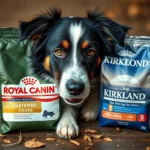
Introduction
When it comes to dog nutrition, understanding what your canine companion should and shouldn’t eat is crucial for their health and well-being. An appropriate diet helps maintain their energy levels, promotes a healthy coat, and supports overall vitality. As pet owners, we often seek to enhance our dogs’ meals with various flavors and ingredients. This raises the question: can dogs eat relish?
Relish is a common condiment made from a mix of ingredients that can vary widely. Typically, it includes pickles, spices, vinegar, and sometimes sugar. While relish might add a burst of flavor to our meals, it’s essential to consider whether these ingredients are safe and beneficial for dogs. This article will explore the implications of feeding relish to dogs, focusing on its nutritional aspects and potential health risks.
Understanding Dog Nutrition
Basic Nutritional Needs of Dogs
Dogs require a balanced diet that includes three primary macronutrients: proteins, fats, and carbohydrates.
- Proteins are vital for muscle development, tissue repair, and overall growth. They should make up a significant part of a dog’s diet.
- Fats provide energy and support cell structure. Healthy fats, such as those found in fish oil, are crucial for a shiny coat and healthy skin.
- Carbohydrates serve as an energy source and aid in digestive health. Whole grains and vegetables are excellent choices.
In addition to these macronutrients, dogs need a variety of vitamins and minerals to support their immune system and metabolic functions. Water is also an essential component of their diet, helping to maintain hydration and proper bodily functions.
Common Dietary Requirements by Dog Breed and Size
Nutritional needs can vary significantly depending on a dog’s size and breed.
- Small Breeds: Often have faster metabolisms and may require higher calorie content in their food.
- Medium Breeds: Usually have balanced nutritional needs that align between small and large breeds.
- Large Breeds: Often require diets that support joint health due to the strain on their bones and joints.
Additionally, a dog’s life stage—puppy, adult, or senior—affects its dietary requirements. Puppies need more calories and nutrients for growth, while senior dogs often benefit from diets that support joint health and are lower in calories to prevent obesity.
What is Relish?
Definition and Common Ingredients
Relish is a condiment typically made from chopped vegetables or fruits, often seasoned with spices and vinegar. The flavor profile of relish can range from sweet to tangy, making it an appealing addition to human meals.
Common ingredients found in relish include:
- Pickles: Cucumbers that have been pickled in vinegar and spices.
- Spices: Various spices are added for flavor, which can include mustard, coriander, and others.
- Vinegar: Often used as a preservative and flavor enhancer.
- Sugars: Sometimes added for sweetness.
Types of Relish
There are several types of relish, including:
- Dill Relish: Made with dill pickles, it provides a tangy flavor.
- Sweet Relish: Contains added sugars, resulting in a sweeter taste.
- Specialty Relishes: These can include fruit-based relishes or regional variations, such as Indian or American-style relishes.
Each type of relish may have different effects on dogs due to the varying ingredients used.
Can Dogs Eat Relish?
Safety of Relish for Dogs
It’s important to evaluate the safety of relish for dogs. While not all relish is harmful, some common ingredients can pose risks:
- Onions and Garlic: These ingredients are toxic to dogs and can lead to serious health issues, including hemolytic anemia.
- High Sodium Content: Many relishes contain salt, which can lead to sodium ion poisoning, dehydration, and increased blood pressure in dogs.
- Added Sugars and Preservatives: Excessive sugar can lead to obesity and other metabolic issues in dogs.
Before introducing any new food into your dog’s diet, it’s crucial to read the ingredient labels carefully.
Nutritional Value of Relish for Dogs
While relish may add flavor, its nutritional benefits for dogs are minimal. Most commercial relishes are high in sodium and sugars, which do not provide essential nutrients that dogs require. Instead of relying on relish, consider healthier alternatives to enhance your dog’s meals.
Possible Health Risks of Feeding Relish to Dogs
Short-Term Effects
If a dog consumes relish, they may experience mild reactions, especially if they have a sensitive stomach:
- Digestive Upset: Symptoms may include vomiting or diarrhea.
- Allergic Reactions: Some dogs may have allergies to specific ingredients in relish, leading to skin irritations or gastrointestinal issues.
If your dog displays any of these symptoms after consuming relish, it’s advisable to contact your veterinarian for guidance.
Long-Term Health Concerns
Regular consumption of relish can lead to several health concerns:
- Obesity: The high sugar and fat content in certain relishes can contribute to weight gain in dogs.
- Diet-Related Diseases: Excessive sodium and sugar intake can lead to long-term health problems, including heart disease, diabetes, and other metabolic disorders.
It’s essential to monitor your dog’s diet and ensure that any added treats or flavor enhancers are safe and healthy.
Alternatives to Relish in Dog Diets
Safe Flavor Enhancers
Instead of relish, consider using safe flavor enhancers that dogs can enjoy without the risks associated with relish:
- Fruits: Apples (without seeds), blueberries, and bananas can be excellent treats.
- Vegetables: Carrots, green beans, and sweet potatoes are nutrient-rich and safe for dogs.
Incorporating Flavor Without Risk
If you want to introduce new flavors to your dog’s diet, do so gradually. Here are some tips:
- Moderation is Key: Introduce new foods in small amounts to prevent digestive upset.
- Variety is Important: Offer a range of fruits and vegetables to provide diverse nutrients.
- Homemade Dog-safe Sauces: Consider making simple sauces from dog-safe ingredients, such as pureed pumpkin or plain yogurt.
Conclusion
In summary, while relish might seem like an appealing addition to your dog’s diet, it carries several risks that outweigh any potential benefits. The ingredients commonly found in relish can be harmful to dogs, leading to both short-term and long-term health issues. Instead, focus on providing a balanced diet rich in proteins, healthy fats, and safe fruits and vegetables.
Always consult with your veterinarian regarding your dog’s specific dietary needs and before introducing new foods. A well-informed approach to dog nutrition will help ensure your furry friend stays healthy and happy.
FAQs
Can all dogs eat relish?
Not all dogs can safely consume relish, especially if it contains harmful ingredients like onions or garlic. Always check the ingredients before sharing.
What should I do if my dog eats relish?
If your dog accidentally eats relish, monitor them for any signs of distress or illness. If symptoms appear, contact your veterinarian immediately.
Are there any health benefits to feeding dogs relish?
While relish might add flavor, it generally does not provide significant health benefits for dogs and can pose various risks.
What are some safe treats for dogs?
Safe treats for dogs include fruits like apples and blueberries, vegetables like carrots and green beans, and homemade snacks made from dog-safe ingredients.









